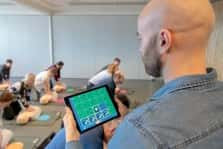Little Anne QCPR training demonstration
3:05
Now with QCPR feedback technology, to help instructors improve CPR training quality, efficiency, and learner engagement.

Research shows that quality bystander CPR is directly associated with positive cardiac arrest outcomes.1,2 Training helps prepare a bystander to deliver CPR, but it is a challenge for instructors to provide accurate and objective feedback on their performance.
Little Junior is now available with feedback technology, which has been shown to improve CPR skill acquisition and performance.3
Little Junior QCPR allows an instructor to monitor up to six learners at the same time from the palm of their hand. The Race with QCPR App provides an easy-to-view performance summary that highlights which students may require further guidance. At a glance, you can see who is not compressing deeply enough, who is not compressing at the correct rate, and who is overventilating. Students can monitor their own performance with the Race with QCPR app or the tethered SkillGuide device.
QCPR measurement and feedback technology enables:
• Real-time feedback on compressions and ventilations
• Post-training debrief, including overall scores and tips for improvement
• Details on compression release, depth and rate, ventilation volume, and number of compressions, ventilations and cycles


QCPR App
One app to control and get feedback from QCPR manikins and Laerdal AED Trainers. Available on the App Store and Google Play
SkillGuide
A small, portable, and lightweight plug-and-play feedback device.
Learn more about SkillGuide

QCPR Classroom
Connect and control up to 42 learners in one training session.
Learn more about QCPR Classroom
QCPR App has been developed as a cross-platform application: This means that the application is supported on a variety of platforms and operating systems.
To enjoy the best experience while using QCPR App, please see below our recommended device configuration.
| Platform | Operating System (OS) |
| Android | Android 10 and above |
| iOS | iOS 13.0 and above |
| Windows (in development) | Windows 10 (version 1903) and above |
*Note that Android GO, Chrome OS and Windows 10 Mobile are not supported.
This article contains a list of devices which paired successfully during product development. It is not exhaustive as many more devices are supported.
QCPR App will work on all types of phone size, but for an optimized experience, we recommend a screen size of 6.1” and a minimum resolution 1792*828 pixels.
It is recommended to have Bluetooth enabled and use version 4.2 or higher to connect to your manikins. To know more about permissions needed for QCPR App, please consult this article.
We recommend your mobile device to have at least 3 GB of RAM and some storage space available (at least 250 MB).
Additionally, your device will need to have a good GPU (graphical power) and CPU (processing/calculation power) for the app to work smoothly.
All existing Little Junior manikins can be upgraded quickly and easily with the Little Junior QCPR Upgrade Kit.
Learn more about how QCPR measurement and feedback technology can help you improve CPR quality, training efficiency and learner engagement.
1. Link MS, Atkins DL, Passman RS, Halperin HR, Samson RA, White RD, Cudnik MT, Berg MD, Kudenchuk PJ, Kerber RE. Part 6: electrical therapies: automated external defibrillators, defibrillation, cardioversion, and pacing: 2010 American Heart Association Guidelines for Cardiopulmonary Resuscitation and Emergency Cardiovascular Care. Circulation. 2010;122(suppl 3):S706 –S719.
2. Dine CJ, Gersh RE, Leary M, Riegel BJ, Bellini LM, Abella BS. Improving cardiopulmonary resuscitation quality and resuscitation training by combining audiovisual feedback and debriefing. Crit Care Med. 2008
3. Smart et al. Does real-time objective feedback and competition improve performance and quality in manikin CPR training – a prospective observational study from several European EMS. Scandinavian Journal of Trauma, Resuscitation and Emergency Medicine. 2015